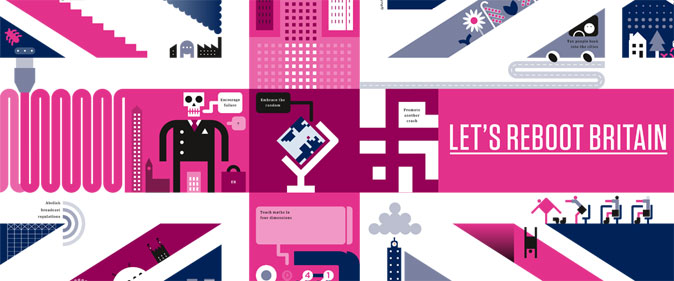By Paul McAuley|01 December 2009

Photo: Peter Grundy
This article was taken from the January issue of Wired UK magazine. Be the first to read Wired's articles in print before they're posted online, and get your hands on loads of additional content by subscribing online
Cities may be more energy-efficient than the countryside, but we can radically enhance that efficiency with existing and achievable technology plus a little imagination, making cities carbon neutral and all but self-sufficient.
Here's a four-step plan:
1 Build intelligently Construction of new buildings consumes materials and creates massive carbon debt. Wherever possible, existing stock should be refurbished and retrofitted using bioarchitectural techniques and recycled and sustainable materials to enhance energy conservation, reduce water consumption, and maximise use of rainwater. Turn office buildings into the equivalent of high-tech beehives; shopping malls into jungle bazaars; point blocks into pinnacles dripping with vines and pocket forests.
2 Go Nuclear Present experience shows sustainable sources of energy - from buildings equipped with solar panels and wind generators to plants generating biofuel and electricity by digesting garbage - will not satisfy the energy demands of large cities. A new generation of compact long-life nuclear power plants such as India's thorium reactor or South Africa's pebble-bed design will plug the power gap and produce small quantities of waste that, unlike carbon dioxide generated by oil- and coal-fired plants, can be safely stored in vitrified form.
3 Stop using fossil fuels Cities are at present vulnerable to the smallest interruptions in oil and gas supply. The first step in cutting this dependency should be a ban on private car ownership in metropolitan areas. Even a sprawling city like London can be comfortably navigated by walking, cycling, and use of public transport - powered, like delivery vehicles servicing businesses and homes, by batteries, biofuels, or hydrogen fuel cells. The great tidal flows of commuters could be reduced by rezoning commercial areas for residential use and introducing workshops and offices into residential areas, as in the human-scale, mixed-use street plans of medieval cities.
At present, 30 per cent of London's carbon budget is consumed by commercial aircraft flights. In the future, all flights should use only biofuels produced by farming GM microalgae that mop up nutrients from sewage and produce ethanol and lipids. Even without genetic modification some strains of algae already yield more than ten to 20 times more biodiesel than rapeseed; the most efficient grow in saltwater, so would not compete for potable water; and fuel production powered by photosynthesis would be carbon neutral.
4 Embrace GM Parking structures and unwanted office and residential tower blocks could be converted to vertical farms where high-value GM crops, produced by open-source research rather than agribusiness, modified for perennial growth and maximum productivity, could be grown year-round using advanced hydroponics systems (drug dealers have already embraced this technology to produce crops of GM marijuana in ordinary houses). Walls and streets would be turfed with tough GM grasses and sedges; these, and thick plantings of trees lining roads, would absorb carbon dioxide and provide equitable microclimates.
From the air, the ideal green city should resemble Mayan ruins poking out of a lush forest. Under the canopy, there'll be densely populated but diverse and vibrant streets humming with every kind of human life. Utopian? You bet. But unless we get a lot smarter very quickly, we'll get the future we deserve: sweltering resource-poor mega-favelas salted with the high-security enclaves of the hyper-rich. Time to choose.
Paul McAuley is a biologist and multi-award-winning science-fiction author. His new novel Gardens of the Sun is published by Gollancz.
Read other articles from the Rebooting Britain series
- Tax people back into the cities
- Teach kids to see in four dimensions
- Exercise a green foreign policy
- Open democracy to the online masses
- Reinvent the way we live together
- Live life as a lottery
- Pull the plug on broadcast regulation
- Enact beta versions of new laws
- Make carbon emissions hurt
- Slash the universities and go virtual
- Make policy using prediction markets
- Promote another crash
- Ditch Twitter: it's dangerous for democracy
- Encourage failure
- Make education more flexible
- Set government data (radically) free
Online editing by Michael Conroy
Want more Wired UK magazine? Get your copy every month by subscribing online today
-----
Via Wired UK

